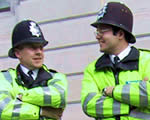 Go to main content
Go to main content
Archive Website of the UK government
Please note that this website has a UK government accesskeys system.
Main menu
Page menu
Young people

If a young person is taken to a police station

If you are stopped or arrested by the police they must let your parents or carers know. Police can't question you unless there is another adult present. Find out what happens if you're stopped, arrested or questioned by the police.
Being stopped or arrested by the police
If the police call at your home they should speak to your parents first
The police can stop you anywhere in public, like the street or a shopping centre, if they think you have been involved in a crime.
They must tell you their:
- name
- police station
- reason for stopping you
You must give the police your name and address, but you don’t have to answer any other questions until you have had legal advice. The police can search you if they think you have drugs or a weapon on you.
If the police come to your home
If the police call at your home they should speak to your parents or carers first. Your parents or carers should be with you when the police speak to you.
You and your parents or carers may want to get legal advice from a solicitor before you answer any questions.
If the police come to your school
The police won’t usually arrest you at your school. If they do, they have to get the permission of the head teacher, who should be with you when you’re arrested.
What happens if you’re arrested
If a police officer thinks you have been involved in a crime they can arrest you and take you to a police station. If you are under 18, the police must tell your parent or carer as soon as possible.
The police officer should tell you:
- why you are being arrested
- which crime they think you have committed
- that you are not free to leave
The officer can use reasonable force as a last resort to stop you trying to run away.
Arriving at a police station
If you have been arrested, you’ll be taken to the custody desk at the police station.
The officer at the desk, the custody officer, will tell you why you’re being held.
You should tell the custody officer your:
- name
- age
- address
- home telephone number
- school
You’ll be searched to make sure you don’t have anything on you that you shouldn’t, like a weapon. The police will take your property, like phones and money, while you are in the station. You’ll get these back when you’re let out.
The custody officer will contact your parents or carer. You’ll be offered free help from a solicitor. You can ask to read the police rule book called the Codes of Practice. This tells you how the police should treat you.
You will be put in a detention room, which will be like a jail cell, until your parents or carers arrive. You don’t have to answer any police questions until your parents or carers get there. The cells will probably be covered by cameras which may also record sound.
Getting help from an appropriate adult
If your parent or carer can’t come to the police station, the police must ask for an ‘appropriate adult’ to be there.
This can be a:
- family member
- friend over 18
- volunteer
- social worker
Being questioned at a police interview
If the police question you it will be in an interview room. The interview will be recorded.
A parent, carer or other appropriate adult will be there to help you answer the questions. You can also ask for a solicitor. You can speak in private to them at any time.
You can't be kept at a police station for more than 24 hours without being charged with a crime. This can be extended to 36 hours if a police superintendent agrees, and longer if a magistrate agrees.
Getting charged with a crime
The police or the Crown Prosecution Service (CPS) will decide if you should be charged, depending on whether there is enough evidence.
If the crime you’re arrested for is serious, like robbery or burglary, or if you have already been warned by the police, you could be charged.
If there isn’t enough evidence, the police could let you go and:
- try to collect more evidence
- not take any more action
Charging is when you are officially accused of the crime, and you will have to go to court.
If you haven’t been in trouble before
If it’s the first time you have been in trouble, and the crime isn’t too serious, the police could:
- officially tell you off - give you a ‘reprimand’
- give you a warning
- get you to agree to behave - making you sign a contract
- ask you to take part in a ‘restorative justice’ conference
If you get in trouble again, you could be charged with a crime and made to go to court.
